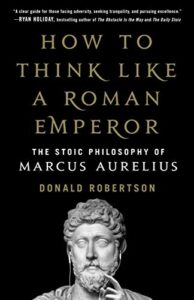Is it possible that philosophical and behavioral concepts practiced and taught over 2,000 years ago are still valid today?
Let’s consider a modern psychotherapy known as Cognitive Behavior Therapy (CBT). CBT is a treatment that modern psychologists use to help those who struggle with depression and anxiety. Using CBT, people are taught techniques and approaches to change destructive behaviors and thought patterns that trigger negative emotions.
As it turns out, many of these techniques are not new. They stem from ancient philosophical teachings, primarily those of Stoicism. In his book, How to Think Like a Roman Emperor: The Stoic Philosophy of Marcus Aurelius, psychotherapist and trainer Donald Robertson shows how the actions and practices of ancient Stoics, focusing primarily on Roman emperor Marcus Aurelius, are fundamentally similar to the techniques taught through CBT.
For the last three years, I’ve become interested in the philosophy of Stoicism. It started with the reading of Ryan Holiday and Stephen Hanselman’s Daily Stoic in 2018. Since then, I’ve been diving deeper into the writings of ancient Stoics, including Epictetus, Seneca, and Marcus Aurelius. It’s interesting to see how the world has changed over the last 2000-plus years while the fundamental nature of what it means to be a good human being has remained constant.
Robertson does an excellent job showing how constant these principles are by focusing on the life of what is considered one of the last great Roman emperors, Marcus Aurelius. Fortunately for us, the history of Aurelius’ upbringing and rise to the throne is well documented. Even more fortunate is a set of written personal reflections from Marcus Aurelius, know as Meditations, that has survived and been preserved since the time of his death. Robertson takes excerpts from the Meditations, interleaves historical events, and shows how Aurelius used his Stoic training and practice to live out the key Stoic character traits of Wisdom, Virtue, Courage, and Moderation. By living these out, Marcus was able to survive and persevere through the challenges of leading the Roman Empire through times of war, disease, and internal division when the Roman Empire was nearly broken apart by a civil war.
Having an interest in Stoicism, I found the book a Must Read. I would highly recommend it if you have any level of interest in the topic. Even if you have no interest in Stoicism, I would still highly recommend the book. Not only does Robertson do a great job discussing the importance of living out Stoic philosophies, but he also does a really good job interleaving the historical events of the Roman Empire during Aurelius reign. In other words, you’ll get to learn both about the history of the Roman Empire and the history of Stoicism and modern behavior therapies at the same time.


Pingback: Book review: Stillness Is the Key